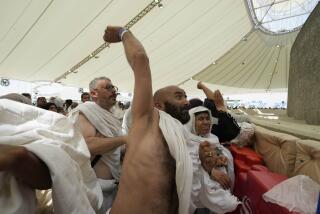San Diego’s Muslims Reach Out
- Share via
The fallout from the terrorist attacks that fastened Americans’ attention on Islam is putting a new face on some of the traditions of Ramadan, the religion’s month of contemplation.
And nowhere is that more true than in San Diego.
The city’s Muslim community has come under scrutiny and received threats since it was revealed that three of the Sept. 11 hijackers had made their home in San Diego; at least one attended a local mosque and two lived with its co-founder.
As a result, a time that is usually observed by turning inward and creating a stronger Muslim community will this year be used to bring in strangers who for two months have been expressing curiosity and doubts about Islam.
San Diego’s 12 mosques for the first time are inviting Christians and Jews and anyone else who is interested to attend Ramadan observances in an attempt to satisfy their curiosity and calm their fears about Islam.
The holy month will start today or Saturday, depending on when the new moon is first sighted.
Muslim leaders also have planned town hall meetings, taken out informational ads in the local newspaper and will hold feed-the-homeless nights downtown.
“We’re basically coming out of our cocoon,” said Mohamad Nasser, head of the newly formed American Muslim Coalition.
Ramadan marks the revelation of the Koran, Islam’s holy book, to the prophet Muhammad. During the monthlong observance, Muslims fast from sunrise to sunset, say additional daily prayers and, on the last and holiest day, celebrate Eid al-Fitr, or Feast of the Fast-Breaking, which falls on Dec. 16 this year.
The San Diego mosques have agreed to celebrate the Eid together for the first time at the city’s convention center. The public is invited.
“There’s a different feeling this year,” said Abdeljalil Mezgouri, an imam at the San Diego Islamic Center, where at least one of the hijackers attended prayers. “We’re open to everyone for Ramadan. You don’t need an appointment. Just come and be our guests.”
Under intense scrutiny since the attacks, San Diego Muslims--a population estimated to be as high as 100,000--have been subjected to scores of FBI interviews, at least five local arrests, the glare of the national and international media, a spate of hate crimes and countless suspicious stares from passersby.
But it’s also been a time that the often-insular Muslim leadership has dived headfirst into the mainstream of the San Diego faith community, working long hours to show their neighbors that Muslims are respectful, peaceful and hard-working people.
“We’ve stepped forward because we have an obligation to tell people about Islam, and how it does not in any way, shape or form condone terrorist attacks,” said Omaran A. Abdeen, a physician born in Chattanooga, Tenn., who is the public relations director for the Islamic Charity Foundation.
In additional to educational outreach, Muslim leaders invited Christians and Jews to a prayer vigil after a cherry bomb exploded outside the Islamic Center after the September terrorist attacks.
And volunteers from other faiths were asked to accompany Muslim women shopping after they received a string of threats.
“We’re getting to know these people by name,” said the Rev. Glenn Allison, executive director of the Ecumenical Council of San Diego County. “We’ve seen greatly intensified activity from the Muslim community.”
The Muslims’ outreach efforts have been “generally positively received” among other faiths, Allison said.
Muslim leaders hope the public’s interest in Ramadan, Islam’s highest profile holiday, will allow them to undo some of the damage done to their faith’s image by the Sept. 11 attacks.
“Many years ago, we Muslims had to take the effort to raise the awareness of ourselves and our holiday,” said Hussam Ayloush, executive director of the Council on American-Islamic Relations in Southern California. “This year we’ll witness the largest ever coverage of Muslims and their holidays. Our prayer is that this will help balance out the negative coverage.”
Still, the specter of the continuing FBI investigation haunts the San Diego community.
Three local Muslims remain in jail after being initially detained--along with two others who have since been released--as material witnesses.
“If there are criminals or suspects among us, we want them to be found,” Nasser said. “We won’t tolerate anything like this in our own community.”
The government’s plans to interview an additional 5,000 men from Muslim countries who are living in the United States were also the topic of conversation Thursday at the Islamic Center.
A 22-year-old man who wanted to be identified only by his first name, Samir, said most Muslim men feel they are under suspicion, even if they were born here.
“The attacks, the FBI interrogations of innocent people and knowing that the government is gathering information on 5,000 more people; all this is making Ramadan different for Muslims,” he said.
San Diego Muslims said they are still unnerved that hijackers Nawaf Alhazmi, Khalid Almihdhar and Hani Hanjour--who were aboard Flight 77 that crashed into the Pentagon--moved about undetected within their community.
“[The terrorists] were good at what they did,” Abdeen said. “It was their business to hide. Now, everyone is much more attentive, more alert, and we’re going to come forward and report any suspicious activity.”
(BEGIN TEXT OF INFOBOX / INFOGRAPHIC)
Season of Fasting
Ramadan is the Muslim holy month that celebrates the revelation of the Koran, Islam’s holy book, to the prophet Muhammad. The month is devoted to sacrifice, community, introspection and charity. The Ramadan fast, during which adults abstain from eating and drinking during the day, s one of the five pillars, or basic duties, of Islam. The other pillars are the shahadah, or profession of faith; the salat, or formal prayer; the zakat, a tithing for charity; and the hajj, a pilgrimage to Mecca.
Source: Council on American-Islamic Relations
More to Read
Sign up for Essential California
The most important California stories and recommendations in your inbox every morning.
You may occasionally receive promotional content from the Los Angeles Times.













